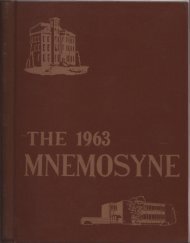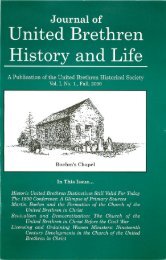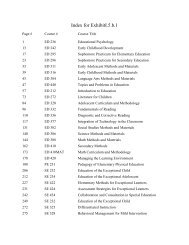Gillian Clark, Christianity and Roman Society - Huntington University
Gillian Clark, Christianity and Roman Society - Huntington University
Gillian Clark, Christianity and Roman Society - Huntington University
Create successful ePaper yourself
Turn your PDF publications into a flip-book with our unique Google optimized e-Paper software.
BOOK REVIEWS 147<br />
Maureen Fitzgerald, Habits of Compassion: Irish Catholic Nuns <strong>and</strong> the Origins<br />
of New York’s Welfare System, 1830-1920. Urbana: <strong>University</strong> of Illinois Press,<br />
2006. Pp. 298. $25.00.<br />
Reviewed by Kathleen Sprows Cummings, <strong>University</strong> of Notre Dame<br />
This book’s opening paragraph describes the funeral procession of Sister Mary Irene<br />
Fitzgibbon in New York City in August 1896. An estimated crowd of twenty thous<strong>and</strong><br />
turned out to mourn Sister Mary Irene, an Irish-American Sister of Charity who had<br />
established the New York Founding Asylum <strong>and</strong> supervised it for twenty-seven years.<br />
Under a headline that proclaimed “Sister Mary Irene is Dead,” the New York Times<br />
praised her as “the most remarkable woman of her age in her sphere of philanthropy.”<br />
The attention lavished upon Fitzgibbon on the occasion of her death st<strong>and</strong>s in<br />
marked contrast to her invisibility in historical studies of American women <strong>and</strong> social<br />
reform. This is true also of Catholic women religious more generally. Though there has<br />
been a flowering of meticulous <strong>and</strong> engaging scholarship on nuns in the last two decades,<br />
this work has rarely been considered by historians of American women. Fitzgerald<br />
ascribes Sister Irene’s “erasure” from women’s history to the overarching Protestant<br />
frameworks that structure the field. Like other women religious, Sister Mary Irene does<br />
not fit those frameworks, <strong>and</strong> therefore disappears from the narrative.<br />
There is good reason to believe that Habits of Compassion will break down this<br />
divide. Fitzgerald situates Irish Catholic sisters squarely within a subject that has become<br />
central to the field of women’s history—maternalist politics <strong>and</strong> the creation of the<br />
welfare state—<strong>and</strong> shows how paying attention to nuns calls conventional interpretations<br />
of that subject into question. Specifically, Fitzgerald challenges “a framework for<br />
American women’s history that renders women of non-dominant cultures <strong>and</strong> poor<br />
women as objects of reform but rarely agents able to influence women <strong>and</strong> men of the<br />
dominant culture or the ideological or institutional premises of the dominant culture<br />
itself” (7). While most historians of American women assume that the existence of the<br />
modern welfare system is owed to the beneficence of elite Protestants, Fitzgerald argues<br />
that it developed both as a result of <strong>and</strong> in response to the efforts of working-class Irish<br />
Catholic sisters to offer succor to the urban poor.<br />
In mid-nineteenth century New York, an increase in Irish migration <strong>and</strong> declining<br />
conditions for the poor collided with middle-class underst<strong>and</strong>ings of children as innocent<br />
<strong>and</strong> therefore redeemable. The “placing-out system” of child care, by which poor<br />
Catholic children were removed permanently from their parents, <strong>and</strong> adopted by<br />
Protestant families, was presented as a means to “rescue” children from lifelong poverty<br />
<strong>and</strong> depravity. Catholic sisters, many of whom came from Irish backgrounds, consciously<br />
created an institutional system of child care as an alternative to the placing-out system.<br />
With the assistance of Tammany Hall politicians, with whom they shared close ethnic<br />
<strong>and</strong> religious ties, New York’s women religious were able to channel public funds toward<br />
relief for the Irish poor that, unlike the charity proffered by Protestant elites, allowed<br />
them to keep family <strong>and</strong> religious bonds intact. Sister Mary Irene’s Founding Asylum
















